A Merx study and the resulting whitepaper look at corporate wellbeing in the Asia-Pacific. The findings? Paul Scroggie tells Tamsin Bradshaw there are plenty of opportunities for growth.
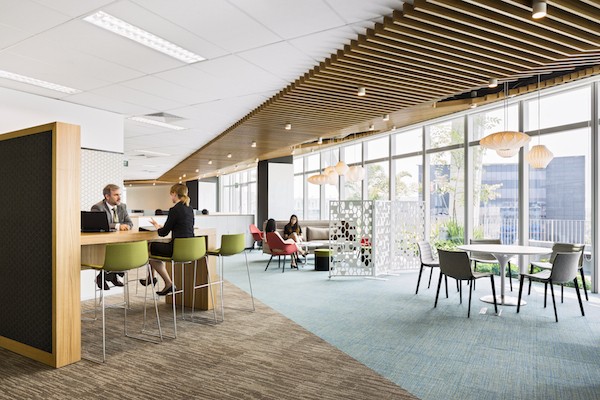
indesignlive.sg
July 5th, 2016
The above image is of collaborative areas at one of J.P. Morgan’s offices. Merx was engaged to work on this project
Some of you may have participated in the Merx Wellness Insight we posted a while back. Driven by Merx, an independent consultancy specialising in project management, construction management, cost management and more, in conjunction with Indesign Media, the Wellness Insight was designed to gauge how workplace wellness is manifesting in businesses across the Asia-Pacific.
Merx compiled the results of the Insight in a whitepaper, which they recently released. Titled Wellness in the Workplace, the paper shows how wellness is coming through in the workplace in Asia, as well as looking at how it impacts on staff physically, psychologically and sociologically. The whitepaper also provides examples of industry benchmarks and standards that will show companies across the region how they stack up against their peers.
Ergonomics in the workplace is one of the issues the Wellness in the Workplace whitepaper addresses. There is, says the whitepaper, “a real opportunity for organisations to focus on enhancing ergonomics.” While 68 percent of respondents to the Wellness Insight said their company provides some sort of ergonomic set-up, there are still 32 percent of respondents who say their company provides no ergonomic at-desk set-up. And 48 percent of respondents stated that their company provides no sit-to-stand desks.
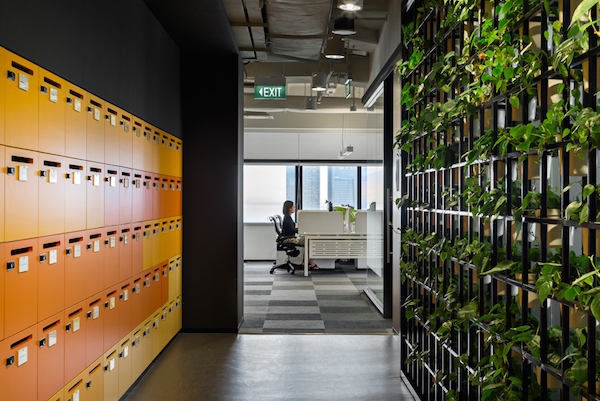
Ergonomic seating at EDB’s offices. Merx consulted on this project
“There is a direct correlation between ergonomics and productivity. If you’re comfortable at a desk, you’re going to work more efficiently,” explains Paul Scroggie, Director, Hong Kong, Macau and PRC, for Merx. “Why wouldn’t an organisation make absolutely sure that ergonomics were factored into their workspace? It’s such an easy hit.”
He does, however, point out that 20 percent of respondents said their companies provide sit-to-stand desk facilities for all staff. “They are typically twice the price of a normal desk, so that’s pretty amazing,” he says.
Scroggie was particularly intrigued by the results in relation to flexible working. “Nearly 40 percent of respondents said their organisations did not have a formal or informal flexible working policy in place,” he says. Indeed, only 32 percent of respondents said their company provided formal flexible working policies. “To provide some sort of flexible working policy is really a no brainer in this day and age,” he says.
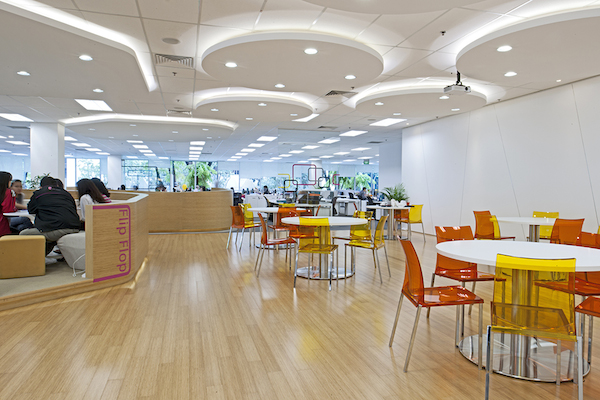
There are plenty of ways of working at WPP. Merx was also involved in their Singapore project
The Wellness Insight conducted by Merx in collaboration with Indesign also looked at attitudes to flexible working, asking respondents to state whether they agreed or disagreed that it’s a commonly held belief that flexible working increases productivity. “Only 32 percent of respondents agreed or strongly agreed – there’s a big blank area there,” says Scroggie.
This is something the Merx whitepaper addresses. “Flexible working is clearly the way of the future. Both in terms of access to a variety of settings combined with a more informed view towards working hours and location,” it says.
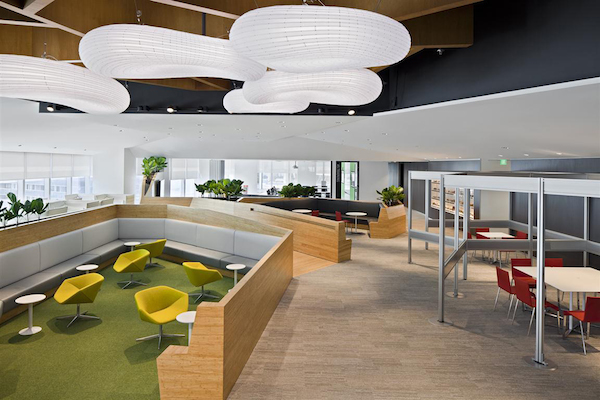
Flexible ways of working at BHP’s offices, which Merx consulted on
According to the whitepaper, organisations that struggle to retain talent will find it harder to stay competitive. “Effective wellness programmes will become increasingly more important in retaining top talent,” states the report.
A third key finding from the Insight related to employee value. With 36 percent reporting that employee value is not a core consideration at their organisation, there is plenty of room for growth. This was a result that surprised Scroggie. “How could it not be a core consideration?” he asks.
Other findings related to work-life balance, collaborative spaces and more, with 79 percent of respondents saying their company offers some form of collaborative space, and 54 percent of respondents saying their company provides no snacks or fresh fruit. “Coffee supply is universal,” says Scroggie. “But at what quality? Providing a really good coffee machine in your collaborative area is a gravitational pull.”
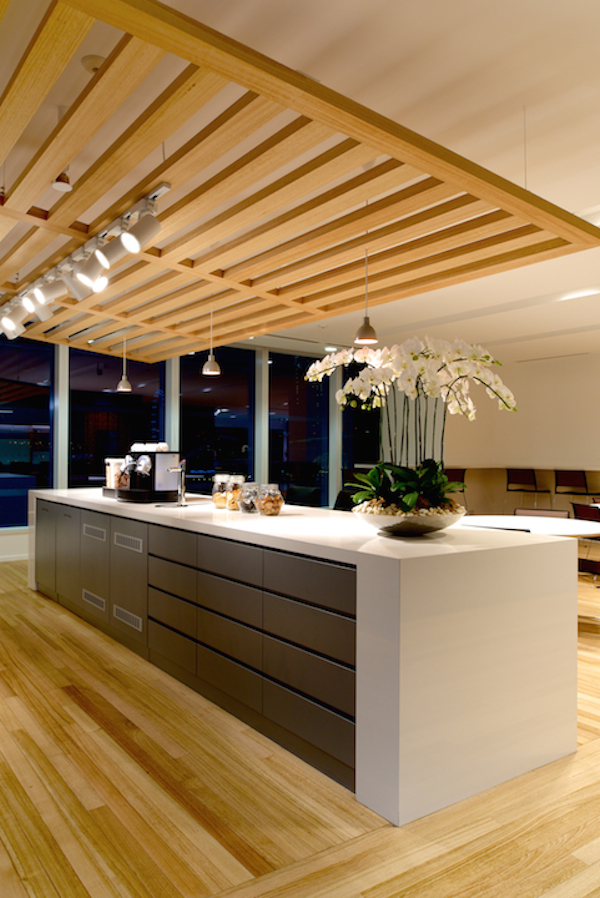
Placing a great coffee machine in your collaborative area is a gravitational pull, says Scroggie. Pictured are LukOil’s offices, which Merx worked on
Scroggie and Merx as a whole have plenty of suggestions for how organisations can improve staff wellness – physically, psychologically and sociologically – and therefore retain and attract talent. These are summarised in the whitepaper as determining the needs of your employees; developing a structured action plan and measuring the effectiveness of that plan once actioned.
As part of the Wellness Insight run by Merx and Indesign, several participants will receive one of three fantastic prizes. Alice Chan from Hong Kong will receive the Disc or Horizon light, courtesy of Humanscale, while Owen Warne from Singapore will receive the ON chair, courtesy of Wilkhahn, and Alexander Bangel from Hong Kong will receive the Panton C1 chair, courtesy of JEB. Prize recipients will be contacted directly.
To read Merx’s whitepaper, Wellness in the Workplace, click here.
Merx
Merxcm.com
A searchable and comprehensive guide for specifying leading products and their suppliers
Keep up to date with the latest and greatest from our industry BFF's!

Marylou Cafaro’s first trendjournal sparked a powerful, decades-long movement in joinery designs and finishes which eventually saw Australian design develop its independence and characteristic style. Now, polytec offers all-new insights into the future of Australian design.

Sub-Zero and Wolf’s prestigious Kitchen Design Contest (KDC) has celebrated the very best in kitchen innovation and aesthetics for three decades now. Recognising premier kitchen design professionals from around the globe, the KDC facilitates innovation, style and functionality that pushes boundaries.
The internet never sleeps! Here's the stuff you might have missed

Adaptive reuse is all the rage across the design industry, and rightly so. Here, we present a selection of articles on this most effective approach to sustainability.

Set to undergo a $60-million revitalisation, the National Gallery of Australia has announced the launch of a landscape design competition for its Sculpture Garden.